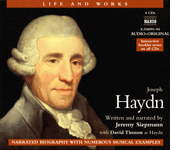What does all of this rambling signify, you ask? Well, I've been listening to so many nonfiction audiobooks over the past couple of years that they are bound to overlap, especially since I gravitate toward certain historical subjects. During the past couple of months, I've listened to books about Napoleon's wars, the French invasion of Egypt, the political upheavals of the late 18th century, Haydn, and Beethoven. I mean, how great is it when one book mentions the French Revolution in passing as it relates to, say, Haydn's life, and then another book barely mentions Haydn but foregrounds Marie Antoinette and Louis XVI during the revolution?! It's like looking at the same set of historical events and circumstances, but through a variety of colored lenses.
And so, I present to you these several books and the recommendation that you read them together if you want to get a firm grasp of the late-18th and early-19th centuries- a time that, you know, kind of shaped and influenced the world we live in today. Alright- here they are:
The Great Upheaval: America and the Birth of the Modern World, 1788-1800 (2007) by Jay Winik
Napoleon's Wars: An International History (2009) by Charles Esdaile

Mirage: Napoleon's Scientists and the Unveiling of Egypt (2007) by Nina Burleigh

Life and Works: Haydn (2003) by Jeremy Siepmann
Beethoven: The Universal Composer (2005) by Edmund Morris
No comments:
Post a Comment